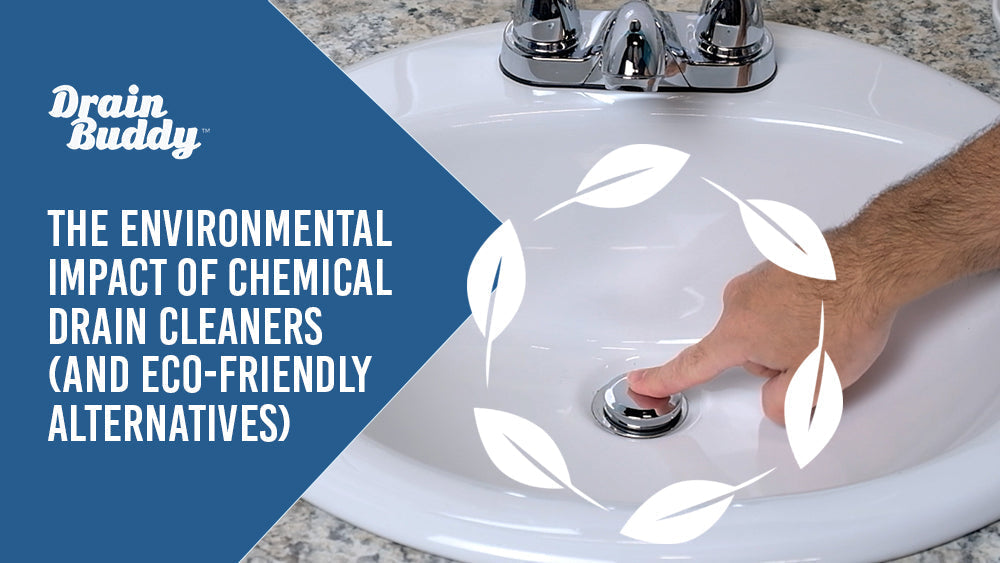Summary:
- Chemical drain cleaners contribute to water, soil, and air pollution.
- Toxic ingredients such as sodium hydroxide and sulfuric acid are harmful to aquatic life and human health.
- These substances often cause pipe corrosion and soil contamination through leaks and improper disposal.
-
Eco-friendly alternatives such as enzyme-based cleaners, baking soda with vinegar, and Drain Buddy provide safer, effective solutions.
Chemical drain cleaners are a common fixture in households due to their quick and convenient application. However, this convenience comes with significant trade-offs. These cleaners contain aggressive chemical compounds designed to dissolve clogs but end up harming much more than just the blockage. Their usage has led to increasing concerns regarding environmental degradation, human health, and long-term plumbing damage.
This article outlines the major environmental hazards caused by chemical drain cleaners and explores practical, eco-friendly alternatives that are safe, effective, and sustainable. Among these alternatives, Drain Buddy emerges as a leading solution that eliminates the need for harsh chemicals by preventing clogs altogether.
Environmental Impacts of Chemical Drain Cleaners
The chemicals used in many drain cleaning products don’t just disappear after use. Their effects ripple through the environment in various ways. Below is a breakdown of their primary ecological consequences.
1. Water Pollution
Chemical drain cleaners often reach waterways through household plumbing systems and wastewater.
- Direct Toxicity: Common ingredients like sodium hydroxide and sulfuric acid are highly toxic to aquatic life.
- pH Disruption: These chemicals alter the pH levels of water bodies, which can severely affect ecosystems, especially species sensitive to changes in acidity.
- Bioaccumulation: Toxins can accumulate in fish and other organisms, magnifying their impact as they move up the food chain.
A 2021 report by the U.S. Environmental Protection Agency found that nearly 46% of rivers and streams in the United States are in poor biological condition, with chemical runoff, including household cleaners, being a contributing factor.
2. Soil Contamination
When not disposed of properly or when leaking pipes are involved, these chemicals make their way into soil systems.
- Leaking Pipes: Over time, chemical exposure degrades pipes, allowing chemicals to seep into surrounding soil.
- Improper Disposal: Pouring leftover drain cleaners outdoors or into storm drains can contaminate the soil and groundwater.
3. Air Pollution
Air quality is also affected by the fumes released during chemical reactions, especially in poorly ventilated areas. Some cleaners emit chlorine or other gases that pose respiratory hazards. Prolonged exposure may trigger asthma, headaches, or skin irritation.
4. Damage to Plumbing Systems
Chemical drain cleaners not only harm the environment but also accelerate plumbing deterioration. Frequent use leads to the erosion of metal and even PVC pipes, eventually causing leaks and increasing maintenance costs.
Eco-Friendly Alternatives to Chemical Drain Cleaners
Switching to eco-conscious methods can significantly reduce environmental impact. The following alternatives are effective, affordable, and safe for plumbing systems.
1. Baking Soda and Vinegar
The chemical reaction between baking soda and vinegar creates a fizzing action that helps loosen light clogs.
- Ideal for kitchen sinks and bathroom drains
- Safe for use on all pipe types
2. Boiling Water
Hot water can be used to break down grease or soap buildup.
- Best for minor clogs caused by fatty residues
- Easy and chemical-free
3. Plunger or Drain Snake
Manual tools that physically remove blockages without relying on chemicals.
- Effective for stubborn clogs
- Widely available and reusable
4. Enzyme-Based Cleaners
Natural enzymes or bacteria digest organic matter in drains, making them effective and eco-friendly.
- Biodegradable and non-toxic
- Safe for pets, children, and plumbing systems
5. Hair Catchers and Drain Strainers
Preventing clogs is the most sustainable strategy. Devices like Drain Buddy capture hair and debris before they enter the pipes.
Key Features of Drain Buddy:
- Installation-free 2-in-1 stopper and hair catcher
- Fits 90% of household drains, covering most tubs, sinks, and utility basins
- Equipped with 6 replaceable baskets, reducing waste
- Mold-resistant and easy-to-clean design
- Catches hair and even small jewelry, keeping it out of sight but easy to recover
- Available in 4 elegant finishes to match modern bathroom aesthetics
Conclusion
Chemical drain cleaners, while convenient, come with serious environmental and structural drawbacks. Their toxic components can harm aquatic life, contaminate soil, pollute indoor air, and degrade plumbing infrastructure. Fortunately, there are reliable, eco-friendly solutions available.
Options such as baking soda and vinegar, enzyme-based cleaners, and physical tools provide effective alternatives without compromising safety or the environment. Most importantly, preventive tools like Drain Buddy offer a sustainable approach by stopping clogs at the source.







